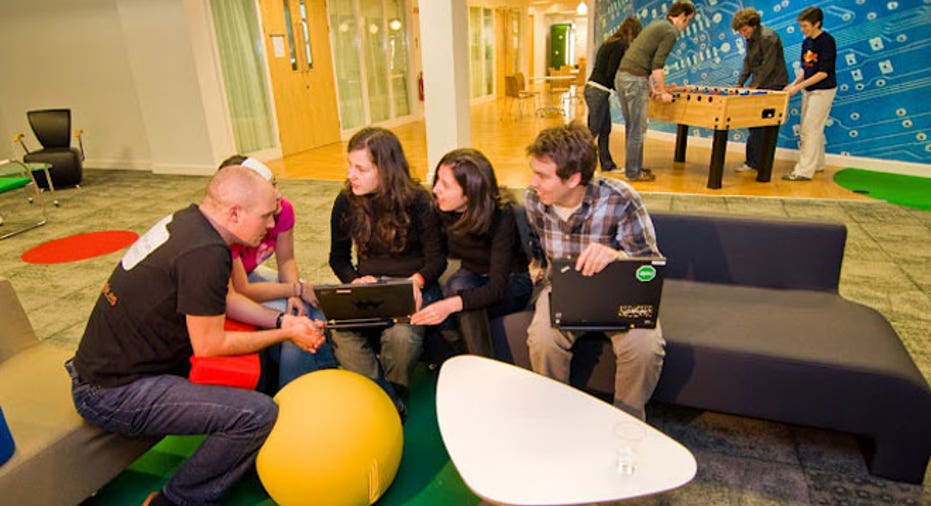Your Employees Don't All Want the Same Company Culture ... Now What?

No two people are exactly alike. Marketers recognize this and tailor their messages to their target audience's needs, because they know consumers in different demographics won't respond to the same tactics. Like consumers with the brands they choose, employees don't all want the same things in an employer, and yet some companies continue to take a "one-size-fits-all" approach to workplace satisfaction.
"Each employee has different needs," said Andrew Johnson, resource manager at staffing firm Kavaliro. "[They] will have different goals and perceptions of corporate culture. Corporations must adapt to formulate different approaches, to seal the generational gaps and diverse personality traits for all employees to thrive and be happy in a particular corporate culture."
Employee engagement is and should be important to any employer, and most companies now have some sort of employee recognition program in place to help with that goal. But psychologist Paul White, co-author of "The Five Languages of Appreciation in the Workplace" (Northfield Publishing, 2012) and "Rising Above a Toxic Workplace: Taking Care of Yourself in an Unhealthy Environment" (Northfield Publishing, 2014), said these programs are generally ineffective. [Leadership Report Card: Why Most Managers Don't Get an 'A']
"Traditional employee recognition programs aren't working to help people feel satisfied or valued," White told Business News Daily. "Most programs focus on words — emails, achievement awards, etc. Not everyone feels appreciated [like this], so if you do the same actions for most people, you're going to miss a lot of them."
Standard recognition tactics tend to revolve around words of affirmation, one of the five "languages of appreciation" in the workplace, which White describes in his book. But some individuals view these as superficial and inauthentic, and may respond with skepticism, cynicism and sarcasm, White said. These employees want to see something more substantive, such as individual attention or quality time with their boss and/or colleagues, acts of service that make their jobs easier (offering to pitch in on a project or do a favor), tangible gifts or bonuses, or physical touch in the form of high-fives, fist bumps or handshakes, depending on the company culture.
White noted that employers need to be aware of which "language" best speaks to each employee, and remember that it may not necessarily align with their own personal ideas of appreciation.
"[Think about] actions that are meaningful to [the employee] versus what's meaningful to the giver," White said. "We tend to give appreciation in ways that are meaningful to us, but if [the recipients] think it's not authentic, it can create damage and make them think you're trying to manipulate them."
While you shouldn't rely solely on stereotypes when determining how to treat different employee groups, the broad, general differences between generational cohorts and personality types, for example, can be a helpful place to start. Based on White's five languages and Johnson's insights into the key traits and interests of these major workplace groupings, here are some tactics that are likely to resonate with each segment.
Generation: Millennials have been raised in the technology era and yearn to have information immediately accessible. They respond best to networking opportunities, interactive training and open contact with supervisors (quality time). In contrast, Gen Xers and baby boomers were raised to work hard and to be independent at an early age, Johnson said. A structured work environment, liberal management styles and competitive benefits (acts of service, tangible gifts) are best for reaching this group.
Personality type: Introverts in the workplace avoid being outspoken and are typically characterized as thinkers who prefer to be in an environment where they can listen and make an informed decision, Johnson said. One-on-one reviews, break times for innovative thought and anonymous workplace surveys (words of affirmation, quality time) can help introverts feel more satisfied at work. Extroverts thrive in an environment of constant contact with other individuals, so offer them networking events, volunteer opportunities, group functions and company events (quality time, acts of service).
"Corporations must embrace a broad, efficient culture [that allows] every employee, regardless of personality or generational difference, the opportunity to be heard and achieve their particular individual goals," Johnson said. "Recognizing employees for their accomplishments is necessary, and [you can] convey those sentiments in various ways, such as congratulating the extrovert millennial employee on social media for work anniversaries, or one-on-one quarterly reviews to appease the introvert."
Originally published on Business News Daily.



















